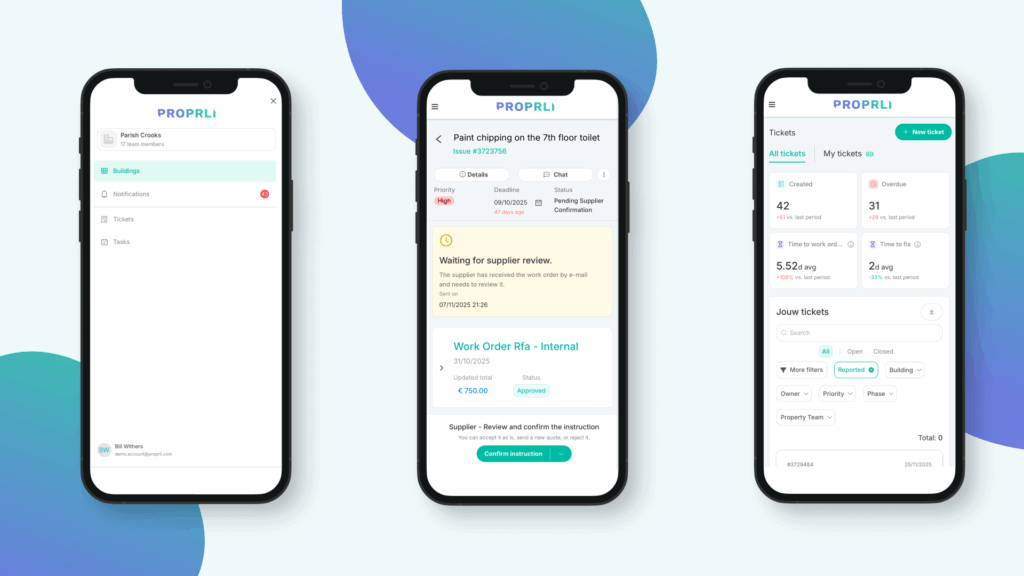Managing properties in the European Union comes with a multitude of regulations and legal duties. It’s crucial to ensure tenant safety and protect their personal data. Non-compliance can lead to significant fines, legal battles, and harm to your reputation.
To guide you through these complexities, we’ve created a detailed building statutory compliance checklist. It focuses on health and safety, data protection, and environmental laws. This checklist will help you navigate EU standards for your properties.
Effective compliance management and precise documentation are key to avoiding non-compliance. These steps create a secure and reliable environment for your tenants. This checklist is invaluable, whether you’re an experienced manager or new to the field, helping you meet EU regulations.
Key Takeaways
- Understanding the importance of statutory compliance in property management is crucial for success in the EU market.
- Key EU regulations for property managers include health and safety standards, data protection laws, and environmental regulations.
- Developing a comprehensive building statutory compliance checklist helps ensure properties meet all necessary legal obligations.
- Implementing effective compliance management strategies, such as regular audits and accurate record-keeping, minimizes the risk of non-compliance.
- Staying up-to-date with regulatory changes is essential for maintaining ongoing compliance and avoiding potential fines or legal issues.
Understanding the Importance of Statutory Compliance in Property Management
Statutory compliance is a critical aspect of property management, ensuring the safety and well-being of all on the premises. Adhering to EU regulations and conducting regular audits and risk assessments are essential. A comprehensive policy framework helps property managers navigate complex obligations and minimize risks.
Compliance with safety regulations and housing codes is crucial for mitigating hazards. Property managers must ensure functional wiring systems, dependable water supply, and smoke detectors. Failure to comply can lead to financial sanctions, insurance nullification, and reputational damage.
Regular compliance assessments are vital for identifying concerns and evaluating safety protocols. These assessments should cover property conditions to ensure habitability standards are met. Property managers must also stay updated on regulatory changes to refine their compliance measures.
| Compliance Area | Key Considerations |
|---|---|
| Fire Safety | Fire alarm systems, sprinklers, emergency exits, fire extinguishers |
| Electrical Systems | Regular inspections, PAT testing, maintaining electrical safety |
| Plumbing and Water Systems | Prompt assessment and rectification of issues, compliance with health and safety regulations |
| Security Systems | Surveillance cameras, access control systems, security lighting |
| Documentation and Record-Keeping | Maintaining records of inspections, maintenance, and actions taken for addressing compliance issues |
Outsourcing compliance management can help property managers focus on core responsibilities. Relying on facilities services companies or consultants can reduce regulatory risks. It streamlines efforts and fosters a more efficient environment for property management.
In conclusion, statutory compliance is essential for property management. It safeguards the well-being of tenants, staff, and visitors, ensuring the property’s longevity and efficiency. By prioritizing compliance and implementing robust strategies, property managers can navigate EU regulations effectively.
Key EU Regulations for Property Managers to Consider
Property managers in the European Union face a complex regulatory landscape. They must comply with numerous rules to uphold service standards. These regulations span from data protection to energy efficiency, impacting property management significantly. Staying updated on these legal requirements is crucial for effective compliance monitoring and risk reduction.
The General Data Protection Regulation (GDPR) is a pivotal EU rule for property managers. It dictates how personal data can be collected, stored, and processed. This is essential for property management. Managers must implement data protection measures and obtain consent from tenants and stakeholders for personal data handling.
Energy efficiency is another critical area for property managers. The Energy Performance of Buildings Directive (EPBD) mandates energy assessments and energy-saving measures. Managers must collaborate with building owners to meet energy standards and educate tenants on energy use.
| EU Regulation | Key Requirements |
|---|---|
| General Data Protection Regulation (GDPR) | Obtain consent, implement data protection measures, ensure data security |
| Energy Performance of Buildings Directive (EPBD) | Conduct energy assessments, implement energy-saving measures, inform tenants |
| Waste Electrical and Electronic Equipment (WEEE) Directive | Ensure proper disposal of electronic waste, maintain disposal records |
| Legionella Control Regulations | Conduct risk assessments, implement control measures, maintain records |
Property managers must also be aware of other EU directives and national laws. For instance, the WEEE Directive requires proper electronic waste disposal. The Legionella Control Regulations demand regular risk assessments and control measures for water systems.
To monitor compliance effectively, property managers should create detailed checklists and maintain thorough records. A proactive compliance approach helps avoid legal issues and enhances market reputation.
Developing a Comprehensive Statutory Compliance Checklist
To effectively manage statutory compliance in the property management industry, it is crucial to develop a comprehensive checklist that covers all relevant EU regulations. This statutory compliance checklist should serve as a roadmap for property managers. It ensures they adhere to the necessary legal requirements and maintain a robust compliance management system.
When creating a statutory compliance checklist, property managers should consider including the following key elements:
- Registering the property with local authorities and obtaining necessary licenses
- Ensuring the property meets health and safety standards, including gas and electrical safety certificates
- Implementing and maintaining fire safety measures in accordance with EU regulations
- Complying with energy efficiency standards and providing tenants with Energy Performance Certificates (EPCs)
- Protecting tenant rights, such as providing fair tenancy agreements and handling deposits in accordance with legal requirements
- Maintaining accurate and up-to-date documentation, including tenancy agreements, inventory reports, and maintenance records
In addition to these general requirements, property managers should also be aware of industry-specific regulations that may apply to their properties. For example, short-term rental properties may be subject to additional local regulations. Properties housing vulnerable tenants may need to meet specific accessibility and safety standards.
| Compliance Area | Key Considerations |
|---|---|
| Health and Safety | Gas safety certificates, electrical safety inspections, fire safety measures, asbestos management |
| Energy Efficiency | Energy Performance Certificates (EPCs), minimum energy efficiency standards (MEES), energy-saving measures |
| Tenant Rights | Fair tenancy agreements, deposit protection, right to rent checks, tenant privacy and data protection |
| Property Licensing | Mandatory licensing for Houses in Multiple Occupation (HMOs), selective licensing schemes, short-term rental regulations |
To ensure that the statutory compliance checklist remains effective, property managers should regularly review and update it. This should be done in line with any changes to EU regulations or industry best practices. A proactive approach to compliance management will help property managers stay ahead of potential issues. It will also maintain a strong policy framework that protects both their clients’ investments and their tenants’ well-being.
By developing a comprehensive statutory compliance checklist and integrating it into their overall compliance management strategy, property managers can minimize the risk of non-compliance. This approach avoids costly penalties and creates a safe and legally compliant environment for their tenants. Such efforts will help build trust and foster long-term relationships with clients and tenants alike.
Implementing Effective Compliance Management Strategies
Effective compliance management strategies are vital for property managers to navigate EU regulations. They ensure statutory compliance, mitigate risks, and avoid penalties. This approach helps maintain a positive industry reputation.
Conducting regular EU risk assessments is a key aspect of compliance management. Property managers must identify, analyze, and evaluate potential compliance risks. Staying updated with EU regulations, like GDPR and EPBD, is crucial. This proactive approach helps develop targeted strategies to address compliance gaps.
Effective compliance monitoring is essential. Property managers need robust systems to continuously monitor compliance status. Real-time monitoring systems and regular audits are recommended. These tools help detect and address issues promptly.
To foster a culture of compliance, continuous training is necessary. Property managers should invest in training programs for employees. These programs keep employees informed and equipped to maintain compliance. Regular updates to training materials are vital when regulations change.
Clear incident response plans are crucial for managing compliance violations. Property managers should develop procedures for responding to breaches. Having a Chief Compliance Officer (CCO) ensures compliance issues are addressed promptly.
| Compliance Management Strategy | Key Elements |
|---|---|
| EU Risk Assessment |
|
| Compliance Monitoring |
|
| Employee Training |
|
| Incident Response |
|
Implementing these strategies helps property managers navigate EU regulations effectively. Robust systems, processes, and employee training mitigate risks and penalties. This approach ensures statutory compliance and maintains a strong industry reputation.
Maintaining Accurate Documentation and Record-Keeping
Accurate documentation and record-keeping are crucial for property managers to meet EU regulations. Proper records not only show legal compliance but also aid in future maintenance and legal defense. It’s vital to keep detailed records of inspections, certifications, and assessments for gas, electrical, fire safety, and water systems.
Studies show that 85% of compliance issues stem from inadequate documentation and record-keeping. Companies with solid compliance documentation have a 95% success rate. Yet, 65% of violations are due to poor records management and unclear roles and responsibilities.
To ensure statutory compliance, property managers should adhere to best practices for record retention:
- Employment records should be retained for 3–7 years after termination
- Payroll records must be kept for at least 3 years
- Tax records should be retained for at least 4 years
- Benefits records should be retained for 6 years after the plan year ends
- Training records should be kept for the duration of employment plus a few years after termination
- Performance reviews should be retained for 3-5 years after termination
Investing in modern records management solutions can boost compliance efficiency by 50%. Regular updates to compliance procedures can cut risks by 30%. Property managers should also perform internal audits, as those who do have 40% fewer violations than those who don’t.
| Compliance Challenge | Percentage of Organizations Affected |
|---|---|
| Lack of proper documentation and record-keeping processes | 85% |
| Inadequate training programs for employees | 70% |
| Improper records management and lack of clarity in roles and responsibilities | 65% |
By focusing on accurate documentation and record-keeping, property managers can maintain high compliance levels, avoid hefty fines, and uphold a strong industry reputation. Investing in effective records management and regularly reviewing compliance procedures are essential for navigating today’s complex regulatory landscape.
Monitoring and Auditing Compliance Efforts
Ensuring ongoing adherence to EU regulations in property management requires regular monitoring and auditing of compliance efforts. Property managers should establish a system for tracking compliance tasks, deadlines, and completions. This proactive approach to statutory compliance can be achieved through specialized software or well-organized spreadsheets. These tools enable easy monitoring of compliance activities.
Conducting periodic internal audits is crucial for identifying any gaps in compliance and allowing for timely corrective actions. These audits should focus on key areas such as health and safety, labor laws, data security, and industry-specific regulations. Regularly assessing compliance status helps mitigate the risk of penalties and legal issues.
External audits performed by third-party experts provide an unbiased assessment of the property’s compliance with EU regulations. These audits offer valuable insights and recommendations for improvement. They ensure the property management team adheres to statutory requirements. External EU compliance audits are particularly important for maintaining transparency and demonstrating a commitment to legal and ethical practices.
| Audit Type | Frequency | Benefits |
|---|---|---|
| Internal Compliance Monitoring | Monthly or Quarterly | Identifies gaps in compliance, allows for timely corrections |
| External EU Compliance Audit | Annually | Provides unbiased assessment, offers recommendations for improvement |
| EU Risk Assessment | Annually or As Needed | Identifies potential risks, helps prioritize compliance efforts |
In addition to audits, property managers should conduct regular EU risk assessments. These assessments identify potential compliance risks and help prioritize efforts. By focusing on high-risk areas and implementing targeted compliance strategies, property managers can effectively allocate resources. This minimizes the likelihood of non-compliance issues arising.
Monitoring and auditing compliance efforts are essential components of a comprehensive statutory compliance program in property management. Regularly assessing compliance status, identifying areas for improvement, and implementing corrective actions are key. This ensures ongoing adherence to EU regulations and maintains a strong reputation for legal and ethical practices.
Building Statutory Compliance Checklist: Essential Components
Creating a detailed statutory compliance checklist is vital for property managers to meet EU regulations and manage legal duties effectively. A well-structured checklist acts as a cornerstone for solid compliance management. It also aids in setting up a clear policy framework. When crafting a checklist, it’s crucial to include key components that cover all essential aspects of property management.
Property registration is a fundamental part of a statutory compliance checklist. It outlines the steps to register the property with local authorities and keep records up to date. The checklist must also address gas and electrical safety, including inspections, certifications, and maintenance schedules. This ensures compliance with EU regulations.
Fire safety is another critical component. Property managers must conduct regular fire risk assessments, maintain fire alarms and extinguishers, and have emergency evacuation plans in place. The checklist should also cover energy efficiency, such as obtaining Energy Performance Certificates (EPCs) and implementing energy-saving measures. This is necessary to comply with EU directives.
| Compliance Area | Key Requirements |
|---|---|
| Property Registration | Register property with local authorities, maintain accurate records |
| Gas and Electrical Safety | Regular inspections, certifications, maintenance schedules |
| Fire Safety | Fire risk assessments, maintain alarms and extinguishers, emergency plans |
| Energy Efficiency | Obtain EPCs, implement energy-saving measures |
| Tenant Rights | Adhere to tenancy agreements, handle deposits, address repairs promptly |
| Data Protection | Comply with GDPR, secure tenant data, obtain consent for data processing |
| Asbestos Control | Conduct asbestos surveys, manage asbestos-containing materials safely |
| Water System Safety | Legionella risk assessments, maintain water systems, regular testing |
Tenant rights and data protection are crucial components. Property managers must follow tenancy agreements, handle deposits correctly, and address repairs and maintenance issues promptly. It’s also essential to comply with the General Data Protection Regulation (GDPR) to protect tenant data and ensure it’s processed with consent.
Asbestos control and water system safety are also key areas. Property managers need to conduct asbestos surveys, manage asbestos safely, and keep accurate records. Regular Legionella risk assessments and water system maintenance and testing are necessary to prevent health hazards and meet EU regulations.
Finally, a statutory compliance checklist should stress the need for detailed record-keeping. Keeping organized and up-to-date documentation of all compliance activities, certifications, and inspections is vital. It demonstrates adherence to EU regulations and helps manage legal obligations effectively.
Staying Up-to-Date with Regulatory Changes
Regulatory changes in the EU significantly impact property managers, making it crucial to stay informed. EU regulations undergo frequent amendments and updates. Property managers must vigilantly monitor these changes to maintain statutory compliance. Failure to comply can lead to substantial fines, with the ICO imposing penalties up to €20 million for GDPR breaches alone.
To effectively stay current with regulatory changes, property managers should establish a monitoring process. This involves subscribing to regulatory news feeds, attending industry seminars, and consulting with legal experts. By proactively adapting to these changes, property managers can avoid non-compliance risks and potential penalties or legal consequences.
Small businesses and organizations without in-house compliance expertise face significant challenges in keeping up with evolving regulations. However, achieving regulatory compliance can offer a competitive edge. This is particularly true in sectors like financial services, healthcare, and insurance, where customers increasingly seek compliant vendors before contracts are signed.
Property managers must also be aware of other EU regulations, such as the Energy Performance of Buildings Directive (EPBD) and the Anti-Money Laundering Directive (AMLD). Regularly reviewing and updating compliance checklists is essential. This ensures statutory compliance and minimizes the risk of penalties or reputational damage.
Conclusion
Creating a detailed statutory compliance checklist is vital for EU property managers. It’s about understanding the importance of following the law, identifying key regulations, and making a comprehensive checklist. Effective management, precise documentation, and regular audits are also crucial. This ensures property managers can handle EU regulations with confidence.
By focusing on compliance, property managers protect their properties and tenants. They also show a commitment to safety and well-being. This approach not only mitigates legal and financial risks but also builds trust with investors and stakeholders.
Investing in compliance is a strategic move for property management success. It reflects a commitment to ethical practices and fosters trust. Compliance also boosts efficiency and business growth, avoiding costly penalties and legal issues.
In summary, a statutory compliance checklist is key to successful EU property management. Adhering to EU regulations safeguards properties, tenants, and businesses. It also contributes to the real estate industry’s growth and prosperity. Embracing compliance ensures a sustainable and thriving future for all stakeholders.
FAQ
What is statutory compliance in property management?
Statutory compliance in property management means following government laws to ensure safety. It covers employees, visitors, and tenants. This is key for a safe and secure environment in business sites.
Why is statutory compliance important for property managers in the EU?
For EU property managers, compliance is vital for safety and upkeep. It prevents legal issues and saves money on repairs. Regular checks help avoid costly problems.
What are some key EU regulations property managers must be aware of?
EU property managers need to know about GDPR, Energy Performance Regulations, and Asbestos Control. They also must understand Electricity at Work, Regulatory Reform Order, Gas Safety, and Legionella Risk Assessments.
How can property managers develop a comprehensive statutory compliance checklist?
To create a detailed checklist, property managers should include all EU regulations. This includes registration, safety certificates, fire safety, energy efficiency, and tenant rights. It should also cover industry-specific laws.
What strategies can property managers implement for effective compliance management?
Effective strategies include assigning a compliance officer and training staff. They should also have a maintenance plan and hire experts for assessments. Regular inspections and drills are crucial.
Why is maintaining accurate documentation and record-keeping crucial for statutory compliance?
Accurate records show compliance and are useful for future maintenance. They also protect against legal issues. The GDPR requires companies to keep detailed records of consents.
How can property managers monitor and audit their compliance efforts?
Managers can track tasks and deadlines with software or spreadsheets. Regular audits, internal and external, help identify and fix compliance gaps. This keeps compliance proactive.
What are the essential components of a comprehensive statutory compliance checklist?
A detailed checklist covers registration, safety, fire, energy, tenant rights, data protection, and asbestos. It outlines requirements, inspection schedules, and documentation needs.
How can property managers stay up-to-date with regulatory changes in the EU?
Managers can monitor changes by subscribing to news, attending seminars, and consulting legal experts. Staying current ensures compliance and avoids penalties.






